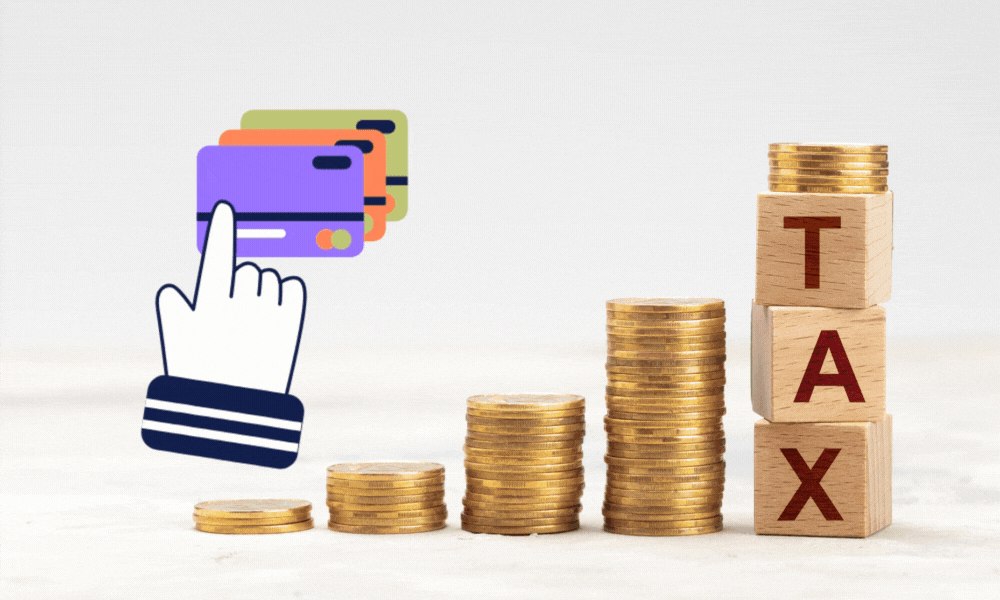George at Travel Blogger Buzz had an interesting scoop today, sharing the news that the IRS is hoping to start taking tax payments by credit and debit cards directly, rather than people having to use third party payment processors.

His source was The Kiplinger Tax Letter, a subscription service focused, as the name suggests, on taxes. Among various other pieces of tax news was the following nugget:
The process for paying taxes by credit or debit card should soon get easier. Now, taxpayers who want to pay their federal taxes by credit or debit card must use an IRS-approved processor and pay fees charged by the processor. IRS issued proposed regs that would let it directly collect credit and debit card payments. Taxpayers using this option would still pay a fee, but the amount should be less.
In George’s post, he expressed concerns that banks could subsequently choose to classify tax payments as cash advances, thereby incurring fees and not earning rewards on credit card payments. I’m less concerned about that because banks could easily do that now when people use existing the third party payment processors.
Instead, I’m mildly optimistic for a couple of reasons. The first is that this will hopefully result in slightly lower fees when paying taxes. There are three authorized payment processors, with fees ranging from 1.82%-1.98% for credit card payments and $2.14-$2.50 for debit card payments (or 1.87% for non-consumer or personal debit cards) – see the full details here. I can’t imagine fees would drop substantially if/when the IRS processes payments directly, but any reduction would be welcome, especially for those with large tax bills.
The second reason is that it might lead to a change in the number of payments you can make each quarter. At the moment, you’re limited to making two payments per processer per quarter. That means you can make a limit of six payments per quarter and up to 24 payments per year. That’s not an issue for the vast majority of people who’d prefer a one-and-done approach each quarter, but I’m sure some would appreciate the ability to increase the number of payments if that comes to pass.
The reason this is so potentially interesting is because of the opportunity to earn rewards when paying taxes with a credit card – you can find our full guide to that here. Paying taxes can be a great way to meet the minimum spend requirements to earn large welcome offer bonuses on new credit cards. Even paying for taxes on a credit card that earns 2% cashback becomes a profitable venture versus paying directly via ACH seeing as existing payment processing fees are less than 2%.
With regards to being able to make more than six payments per quarter, this could be of interest for two types of people. One type is a person who has a substantial tax bill. Being able to make more than six payments could increase the number of welcome offers for which they can hit minimum spend requirements each quarter.
A more common scenario though likely relates to debit card payments. Staples and Office Depot/OfficeMax frequently run deals on Visa and Mastercard gift cards which provide an opportunity to earn lots of rewards by paying with a card that earns more points on office supply store spend. Those deals are always on $200 denominations, so the limit of two payments per processor per quarter limits total payments to $1,186.32 per quarter when accounting for the debit card fees charged by those third party payment processors. If the IRS were to allow an unlimited number of payments each quarter, that would allow people to easily liquidate more of those gift cards, albeit at a ~1% fee. A similar situation would apply for people paying with $500 Visa or Mastercard gift cards purchased from grocery stores, or $100 Visa gift cards when they go on sale at Giftcards.com.
It should be noted that these changes aren’t official yet, nor do we know if the IRS would actually allow more than six payments per quarter. The Kiplinger Tax Letter doesn’t give an indication as to when these changes could be expected to come into force either, although it does say that it should ‘soon get easier’, so fingers crossed that paying the IRS becomes a more appealing prospect in the near future.





[…] My blog finally got a back link from Frequent Miler, can I retire now? IRS planning on taking tax payments directly – hopefully great news. […]
We often end up owing a few thousand dollars each year, sometimes it triggers an underpayment penalty sometimes not. Can we make a single few thousand dollar payment in the fall to help a SUB get met? Any issues from card companies seeing it as cash advance? Any issues from IRS doing a single quarterly payment instead of 4 equal ones through the year?
Yes, you would be able to make a one-off payment if needed and no, there’s no issues with card companies treating tax payments as a cash advance.
With regards to whether there’d be an issue with the IRS if making one single payment rather than four equal ones throughout the year, I can’t advise you on that – that’d be one to either ask the IRS themselves or a tax professional.
Depending on your last year’s AGI, you must timely pay either 90% or 100% of your current year’s tax liability. However, if your income is recognized unevenly throughout the year, you need to apply the appropriate percentage to each calendar quarter. Whether your income is even or uneven, a catch-up payment later in the year would not get you out of an underpayment penalty. Consult with a qualified tax advisor. Best of luck.
PS — 90% is for AGI < $150k
PS — 90% is for AGI < $150k
The rule is slightly more complex and I’ve reduced it to digestible form for laypersons.
Wearing my CPA hat, be careful 🙂
In general, if you think you are going to be a little short, you can make an estimated tax payment, the earlier you make the payment the better (for too complex reasons to explain here).
You must keep good track of these estimated tax payments and also ensure the IRS credits them properly. Everyone should have an account at irs.gov and check the activity on it.
You know, nothing stops anyone from overpaying estimated income taxes and receiving a big refund when the 1040 is filed. This of course assumes you are ok with the IRS holding on to your money instead of you parking it in a higher yield cash account these days.
What makes you think this “will hopefully result in slightly lower fees?”
Maybe I missed something, but low fees are driven by competition and the federal government is famously inefficient. I doubt they are a payment processor and someone with power will get a kickback from the new middleman processor.
The tax letter said “Taxpayers using this option would still pay a fee, but the amount should be less.” Given that, I was assuming that the proposed regs referenced some kind of reduction in fees
Thank you!
“low fees are driven by competition and the federal government is famously inefficient”
This is true. It’s also the case that as the federal government is famously inefficient but also largely incompetent and good at wasting money generally it may permit payment collection at a loss.
I look at the US mint allowing CC payments for dollar coins at face value with free shipping as an example. That went on for years despite rampant abuse and massive costs for the mint. As the government is not primarily concerned with being profitable, nor does it have a pressing need to minimize costs like a business would it may just allow a loss.
The other thought is that banks and payment processors may comply with requests for low card fees on Federal taxes out of negotiation tactics with regulators in order to avoid greater regulations or fee caps elsewhere.
It appears that it will still be a contractor charging fees for processing credit card payments, or at least that is how I read the rule. The difference is whether the contractor charges the fees directly to the taxpayer and then pockets them, or charges the government, which then recoups the fees from the taxpayer. Under the second scenario I assume the fees would be set through bidding process under the federal acquisition process.
I hope they keep Paypal as an option. Since Freedom often has a Paypal as a Q4 category, and we have multiple Freedom cards in my household, I usually make at least one estimated tax payment with Paypal.
Original source here, thanks to Stephen for the back link, much appreciated.
I have been a subscriber to the Kiplinger Tax Letter for longer than most bloggers, it is a fantastic source for tax issues. But, you know, with tax policy and IRS in general, it is fairly common for things that appear in the newsletter to never happen or end up being lobbied out to all kinds of distorted shapes. So, nothing alarming. But this issue IS on the radar and will likely happen at some point imho. What would be the final form is anyone’s guess. But I am lobbing some credit card apps sooner rather than later, likely pushing my 4th Quarter estimated tax payments forward to be bunched together with my 3rd quarter estimated tax payments. Just in case.
I think the Political Blog TravelBloggerBuzz is no longer relevant. Too much negativity there for me.
I fully agree with you Bunny
If this were to come to fruition, I’d have a reason to go back to Simon malls and get their gift cards as opposed to dinking around with the Staples and OD/OM gift cards.
I can only see a negative here. Either fewer payments allowed per quarter (most likely) or higher fees. Limiting the number of payments would be very bad for me.
Hi Steven
how did you get this number $1,486.32 with debit cards payment?
thanks
That was a typo – it should’ve said $1,186.32. Thanks for letting me know – I’ve just fixed that.
Treating cc payments as cash advances would be catastrophic.
If true, it’s about time!
I hate to be a pessimist but when the government takes over something from private industry, it never ends well. The fee may get lowered slightly this year but next year to will go up and up and up each subsequent year…(
But what this really is is that private industry inserted itself between the taxpayer and the customer in order to get a profit. The taxpayer should always been able to pay the IRS directly.
Do you think that if the taxpayer paid by check it should have been required to send the check to some megabank who added a handling fee to the taxpayer? How is this any different?
The IRS will see an opportunity to take a cut of the fee and call it an administrative cost. That fee and the IRS’ ability to add a revenue stream will increase every year just like DMV fees, property taxes, etc. Having three private processors creates competition in the market place, keeping the fees in check. Changing this to a sole provider, especially a government run sole provider, will be disastrous for all of us that use tax payments as a MS play.
The competition will be a check with no fees.
If you read the proposed rule you can see that either the existing or the new case the IRS is contracting with a private company to provide services. So I don’t see how it is the IRS taking over anything from a private industry. It isn’t exactly like paying taxes is a private function anyway.
It appears that the proposed rule preserves the existing contracting option but also allows a new option. Under the existing option the IRS can contract with a private company but is prohibited from paying them a fee for credit card payments. The contractor can then charge their own fee which does not go to the IRS. In this case the IRS has three contractors that can accept payments and charge their own fees to do so.
Under the newly proposed rule the IRS would have an additional option, which is to contract with a company to provide credit payments based on a fee the contractor charges to the government. The IRS could then recoup this fee from the taxpayer. However, note that the rule specifies that the fee can only cover what the IRS is paying the contractor to process the payments.
In either case it appears that the fees provide no financial benefit to the IRS because the fees go to the contractor. In both cases tax payments are made through a company under contract with the IRS, although it is possible under the new option that the payments will be more seamless and look like you are paying the IRS directly.
Whether the new arrangement will be cheaper or not remains to be seen. I assume the new option give the IRS some additional leeway to negotiate fees directly through the contracting process, although I imagine the current process for awarding the three contracts also includes negotiations over fees (but I’m not sure how that works). This might allow them to eek out a tiny benefit. Negotiations would be covered under Federal Acquisition Regulation (FAR) which would drive fees as low as possible, but regardless there would seem to be a big incentive to the IRS to keep fees low to encourage compliance with paying taxes. And it isn’t obvious to me that the existing options will disappear as they seem to be explicitly allowed under the proposed rule.
One thing I would like to see is better integration between the contractor and IRS systems for accepting payment. The current system always feels a bit clunky because you have to wait for the payment to appear in your IRS account.
Anyway, that is how I read the rule. Others might catch things I missed.
The two payments per processor limit isn’t just something the processors want to do, it’s because the IRS itself imposes a limit of two payments per quarter TOTAL. It’s just that I’ve never seen the rule enforced. https://www.irs.gov/payments/frequency-limit-table-by-type-of-tax-payment
Since the IRS says you can only make two 1040-ES payments per quarter, no processor allows you to make more than two – but the processor sites don’t talk to each other, so you can make two per site and the IRS hasn’t seemed to care (which isn’t to say they couldn’t ever care).
This is presumably to limit the IRS’s own burden processing the payments. if the IRS replaced external processors, do we have any reason to think they’d lift this separate limit? Or would they just enforce the two per quarter limit?
The IRS uses third party processors so that the full value of the tax payment is passed onto the government. If the IRS does it themselves, would they just charge the credit card interchange costs – or seek to cover their costs in managing the system? I haven’t read the proposed rulemaking, but I don’t expect a huge change in cost to consumer.
That’s if this happens at all! Presumably the third party processors will be lobbying against it…
Here is the FRN. https://www.federalregister.gov/documents/2024/07/02/2024-14002/update-of-regulations-regarding-payment-of-tax-by-commercially-acceptable-means IRS is collecting through a contractor in either case, and essentially the fee is determined by what the contractor charges to process the credit card payments. Presumably in one case the competition occurs through multiple contractors, and in the other through the FAR regulated competition. (Although even in the current system I assume there is a competitive process to select the three processors.) It appears both options will still be allowed so you could also see competition between the two approaches.
What is the target date for the IRS taking payments directly? Hopefully very soon!
I wouldn’t get too excited. The fee is what pays the rewards. If the fee drops in any meaningful way, the banks will look to reduce or eliminate paying rewards on these payments.
I can’t imagine the fee will drop in a particularly meaningful way as they’ll still have to cover the processing fees. However, even a drop of 0.1% or 0.2% would still be welcome.
The fee that would change would be the part that the payment processors are keeping. The amount to the bank, and to the network, would presumably stay the same.
I was interpreting it to mean that the IRS would cover part of the fee (like any store does), not that the banks would get less.
I don’t think it is allowed under the proposed rule. As I read it the IRS has to recoup exactly the fees charged by the contractor to process the payments, no more, no less.
Yeah, baby!!!